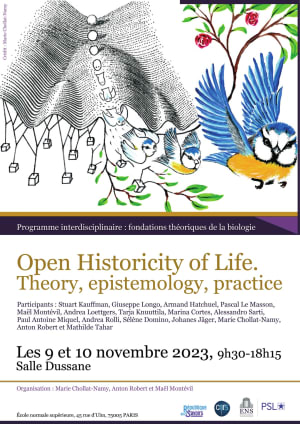Open Historicity of Life. Theory, epistemology, practice

In the last decade, the notion that new possibilities appear over time in biological phenomena has received renewed and growing attention. Kauffman approaches it as the adjacent possible, Sarti and Citti as heterogenesis, and Longo and Montévil as symmetry change and specific objects. Accordingly, there is a growing understanding that this notion is a significant shift and challenge in the way to do science. However, there has yet to be a systematic effort to bring together the different perspectives on this question in biology and in other fields confronted with it. In this conference, we intend to create bridges between the different perspectives that have been developed, mostly independently, on the question of changing possibility spaces in biology.
OPEN HISTORICITY OF LIFE: THEORY, EPISTEMOLOGY, PRACTICE
9 - 10 November 2023
Salle Dussane, École Normale Supérieure, 45 rue d'Ulm, Paris
ORGANIZATION: Marie Chollat-Namy, Maël Montévil, Anton Robert
In the theory of evolution, the forms of life change, and these changes are critical for the understanding of living beings. However, the nature of these changes, and the way to understand them, remains a matter of open discussion. In the XIXth century, physics, especially classical mechanics, was the paradigm of science, and physics understands change as a displacement in an abstract mathematical space. This method has been imported into biology, for example, in population genetics; however, philosophers, notably Bergson, called into question the notion that things (always) exist as a possibility before they become actual. Bergson concludes that there are limits to our ability to understand living being that is intrinsic to mathematics and come from the creativity of evolution. To our knowledge, the only field of biology that built explicitly on this notion is phylogenetic systematics --- however this field also has very specific purposes.
In the last decade, the notion that new possibilities appear over time in biological phenomena has received renewed and growing attention. Kauffman approaches it as the adjacent possible, Sarti and Citti as heterogenesis, and Longo and Montévil as symmetry change and specific objects. Accordingly, there is a growing understanding that this notion is a significant shift and challenge in the way to do science.
However, there has yet to be a systematic effort to bring together the different perspectives on this question in biology and in other fields confronted with it. In this conference, we intend to create bridges between the different perspectives that have been developed, mostly independently, on the question of changing possibility spaces in biology. We aim to discuss the status of this notion: Do new possibilities appear by principle, or can their existence be proven? The second major topic of discussion will be the scientific possibilities and limits that this notion leads to. In particular, can it be captured by existing mathematics, new mathematics, something somewhat different, or no theoretical construct at all? In general, what kind of scientific practice does this question open?
PROGRAM
NOVEMBER 9
- 9h30 Introduction
SESSION 1 : The question of possibility in biology
(Chair: Marie Chollat-Namy)
-
09h45 Sélène Domino, Institut de Systématique, Évolution et Biodiversité (ISYEB), french National Museum of Natural History and Institut d'Histoire and Institut d'Histoire et de Philosophie des Sciences et des Techniques (IHPST), University Paris 1.
Can there be new biological possibilities in Systematics?
-
10h20 Andrea Roli, Department of Computer Science and Engineering, Campus of Cesena, Università di Bologna.
A cybernetic perspective of evolution
-
10h55 Coffee Break
-
11h10 Giuseppe Longo, Centre Cavaillès, République des Savoirs, École Normale Supérieure (ENS), CNRS, Paris.
Twenty years after the 2001 and 2003 lectures on "changing phase spaces" in Biology, the challenge of "novelty production"
-
11h45 Discussion
-
12h15 Lunch break (12h15-14h)
SESSION 2 : Theoretical frameworks accommodating new possibilities
(Chair: Ana Soto)
-
14h Alessandro Sarti, Centre d'analyse et de mathématique sociales (CAMS), École des hautes études en sciences sociales (EHESS), CNRS, Paris.
Beyond possibility spaces: heterogenesis and meaning
-
14h35 Stuart Kauffman, Affiliate Professor, Institute for Systems Biology, Seattle.
A Third Transition in Science
-
15h10 Maël Montévil, Centre Cavaillès, République des Savoirs, École Normale Supérieure (ENS), CNRS, Paris.
Mathematical spaces and biological objects
-
15h45 Discussion
-
16h15 Coffee Break
General Discussion: The question of possibility spaces in biology
(Chair: Mathilde Tahar)
-
16h30 *Discussion *(with the participation of Johannes Jaeger)
-
Dinner (for the speakers)
NOVEMBER 10
SESSION 3: Views across disciplines
(Chair: Anton Robert)
-
09h30 Armand Hatchuel & Pascal Le Masson, Centre de Gestion Scientifique, Mines Paris, PSL.
How can contemporary design science contribute to the theoretical foundations of biology ?
-
10h20 Marina Cortes, Institute for Astrophysics and Space Sciences, University of Lisbon
There will be no absolute truths left in the study of reality.
-
10h55 Coffee Break
-
11h10 Andrea Loettgers & Tarja Knuuttila, Philosophy Department at the University of Vienna.
The combinatorial possibilities of synthetic biology
-
11h45 Discussion
-
12h15 Lunch break (12h15-14h)
SESSION 4: Practical and philosophical perspectives to move forward
(Chair: Carlos Sonnenschein)
-
14h Marie Chollat-Namy, Post-doc, Centre Cavaillès, République des Savoirs, École Normale Supérieure (ENS), Paris.
Perspectives on Anti-entropy as the reconfiguration dynamic of historicity
-
Anton Robert, PhD student, Centre Cavaillès, République des Savoirs, École Normale Supérieure (ENS), Paris.
Physical arguments for an epistemology of new possibilities via a methodical deconstruction of biophysical models
-
14h35 Mathilde Tahar, Laboratoire Savoirs Textes, Langage, University of Lille
How to account for the unpredictability of evolution?
-
15h10 Paul-Antoine Miquel, Équipe de recherche sur les rationalités philosophiques et les savoirs (ERRAPHIS), Université Jean-Jaurès, Toulouse.
Novelty in biological systems
-
15h45 Discussion
-
16h15 Coffee Break
General Discussion: Practical and theoretical perspectives for the future
(Chair: Maël Montévil)
- 16h30 Discussion